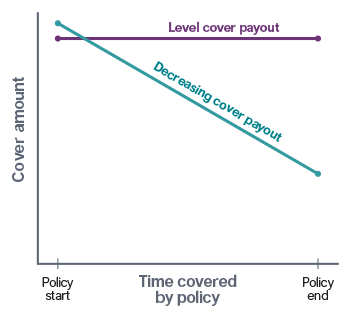Who Should Be Your Nominee for Your Term Insurance?
Term insurance is among the most important financial investments one can make in their lifetime, considering how it offers a crucial security net for their loved ones.
Essentially, term insurance is a life insurance policy that provides coverage for a specific term. It ensures that if the policyholder meets an untimely demise during this period, their beneficiaries receive a death benefit.
Best Term Insurance Plans in UAE
Some of the best Term Insurance quotes in UAE & Dubai are:
Table of Content
A distinctive advantage of a term plan is the provision to select a nominee - a trusted individual who will receive and manage these benefits after the demise of the policyholder. In this article, we will delve deeper into the nuances of term insurance, elucidating the meaning of the insurance nominee meaning, life insurance nominee rules, and much more.
Who is a Nominee?
A nominee in a life or term insurance plan functions as a trustee or a custodian. Chosen by the policyholder, the nominee is entrusted with the task of receiving the death benefits from the insurance provider. Their principal duty is to ensure that this payout is then channelled correctly to the legal heirs or beneficiaries of the deceased policyholder.
Who Can Be Your Nominee for Your Term Insurance?
By properly choosing a nominee for your term insurance, you can ensure that your loved ones are financially secure in your absence. It's essential to understand the guidelines surrounding nominee selection, especially given the stringency with which these rules are often defined.
Let's delve into the specifics -
First-Degree Relatives as Nominees
The fundamental premise of term insurance is to provide financial protection to those who might face a direct monetary loss due to the sudden demise of the insured.
Given this, term insurance policies primarily mandate that the nominees must be first-degree relatives of the policyholder. This includes the spouse, parents, siblings, and children. These individuals are inherently considered to have an insurable interest, implying that their financial well-being could be jeopardised by the unforeseen death of the insured.
For instance: If Ms. Fatima, a working professional in her thirties, wishes to ensure that her younger brother's education isn't hampered in case something happens to her, she can designate him as the nominee of her term insurance policy.
Exclusion of Friends and Non-Relatives
Given the principle of insurable interest, friends or other non-relatives typically don't qualify as nominees for term insurance policies. As their relationship with the policyholder does not inherently denote a financial dependency, it makes their nomination incongruous with the intent of term insurance.
Multiple Nominees in the Policy
A policyholder isn't limited to naming just one individual as the beneficiary. Multiple nominees can be included in a term insurance policy, allowing the insured individual to divide the death benefit among several beneficiaries. This provision ensures that each person that the insured wishes to protect financially gets to receive a portion of the death benefit.
Example: Mr. Ali, a father of two and the sole breadwinner for his family, can designate both his children and his elderly parents as nominees so that the benefits can be available for both parties.
Nominating Minors
While children (below 18 years of age) can be named as nominees, specific stipulations are to be considered first. Given that minors aren't legally permitted to manage finances directly, the policyholder would be required to appoint a guardian.
This guardian, in the event of a claim, will receive the policy's payout on behalf of the minor nominee. Once the child reaches the age of 18, the amount is then transferred to them.
Example: Mrs. Aisha wants to ensure that her 10-year-old daughter is taken care of if she's not around. She can nominate her daughter for the death benefit but will also need to designate her husband or a trusted relative as the guardian to manage the funds until the daughter turns 18.
Nominee Vs Beneficial Nominee
When it comes to life insurance policies, the terms "nominee" and "beneficial nominee" are often misunderstood or used interchangeably. However, there exists a distinct difference between the two.
- The Role of a Nominee - A nominee is essentially a trustee or an intermediary. They are chosen by the policyholder to collect the death benefits from the insurance company and oversee their distribution to the legal heir(s) of the insured. The primary responsibility of the nominee is to make sure that the insurance payout reaches its rightful beneficiary.
- The Beneficial Nominee - A beneficial nominee, on the other hand, is not just a guardian of the death benefit but is also its rightful recipient. They have an absolute claim over the insurance payout, without the necessity of further distribution to any other legal heirs.
Illustrating with an Example
Consider Mr. Kumar, who, at the age of 25, secures a 30-year life insurance plan and nominates his sister to receive the benefits should anything happen to him. Later, at age 30, Mr. Kumar marries. Tragically, he faces an untimely death at 35 without amending his insurance policy's nomination.
In such a scenario, the insurance company would transfer the death benefit to the designated nominee, i.e., his sister. However, if Mr. Kumar didn't have a will stipulating his sister as the beneficiary, the rights to the payout would actually lie with his wife as per succession law, making her the beneficial nominee.
Why is Nomination Important?
Nomination is a vital element of life insurance policies as it facilitates the seamless flow of the benefits of the insurance to the right individuals upon the unfortunate event of the policyholder's demise. More than just a mere procedural formality, it’s also a significant tool for policyholders to ensure the financial security of their loved ones.
Here's why nomination is important -
- Fulfils the Core Objective of Insurance
Life insurance is fundamentally about providing financial security to the dependents of the policyholder in the face of unforeseen circumstances. Through nomination, this purpose is unequivocally served.
Nomination ensures that the policy benefits are directly transferred to the desired beneficiaries without any legal hassles, thereby providing them with financial support when they need it the most.
- Flexibility in Choice
The strength of the nomination facility lies in its flexibility. A policyholder isn't restricted to nominating just immediate family members — they can choose any individual, whether related or unrelated, based on trust and the intended purpose of the benefit.
This feature becomes especially relevant when policyholders have obligations or wishes that extend beyond their immediate family.
- Ensures Broader Coverage
Life insurance policies allow policyholders to appoint more than one nominee. This ensures that the insurance benefits can be distributed among several beneficiaries, accommodating the varied relationships and responsibilities in the policyholder's life.
- Equitable Distribution
By nominating multiple individuals, a policyholder can also dictate the proportion of the sum assured each nominee receives. This provision facilitates an equitable distribution of benefits in line with the policyholder's wishes, providing tailored financial support to each nominee based on their individual requirements or the policyholder’s relationship with them.
- Streamlines Policy Amendment
Nomination isn't set in stone. If circumstances change, such as in the case of the nominee’s marriage or a change in their priorities, the nomination can easily be cancelled or altered. With this flexibility, the policyholder can always ensure that the benefits will go to the right person or people at any given point in time.
- Minimises Legal Complexities
By designating a nominee or multiple nominees, potential disputes and legal battles among claimants are minimised. With a clear nominee, the insurance company has a defined point of contact, which leads to a swift payout of the death benefit without unnecessary delays.
Life Insurance Nominee Rules in UAE
Understanding the nuances of life insurance nominee rules in the UAE is crucial for policyholders to ensure the proper distribution of death benefits.
Some of the factors to be considered are listed below -
- Multiple Nominees - UAE regulations permit policyholders to appoint more than one nominee for their life insurance policy. In such cases, the policyholder should ideally specify the percentage of the death benefit that each nominee will receive to avoid potential disputes.
- Changes to Nomination - Policyholders can alter or update their nominations at any point during the policy's tenure. Regular reviews and updates to the list of nominees can prevent potential future conflicts or misunderstandings.
- Nominee's Rights - The nominated person's role is to receive the policy's death benefit on behalf of the beneficiaries.
Note: There are no general rules for nominees. These rules differ from one insurer to another.
No Nomination Found in a Life Insurance Policy - What’s the Way Forward?
Nominating a beneficiary in a life insurance policy ensures a smooth transition of the policy's death benefits to the intended recipient upon the policyholder's demise. But what transpires when a policyholder does not specify any nominee? How does the existence of a will influence the disbursement of these benefits?
Let’s understand this point in detail below -
- Implications of Not Specifying a Nominee - If you don't specify a nominee in your life insurance policy, the process of disbursing the death benefit becomes more complex and can be subjected to legal procedures. Instead of the insurance company directly paying out the benefits to a named nominee, the matter often falls into the domain of the legal system.
- Role of the Court of Law - In cases where no nomination is made, the court of law steps in to ascertain the rightful legal heir of the deceased policyholder. The court's decision will guide the insurance company on whom to disburse the death benefit. It's noteworthy that for Muslim policyholders, in regions where Sharia law is applicable, the disbursement of assets, including life insurance payout, is typically governed by Sharia principles.
- Influence of a Will - A will can serve as a directive for asset distribution, including the death benefit of a life insurance policy. If a policyholder, despite not specifying a nominee in the insurance policy, has mentioned a beneficiary in their will, it introduces an additional layer of consideration. With that said, it's crucial to understand that the execution of a will may not always be straightforward. Even if a non-family member is named as a beneficiary in a will, the decision to award them the death benefit remains subject to the court's judgment.
The court will review the will and its provisions to determine its legitimacy and ensure that it aligns with legal standards before instructing the insurance company accordingly.
Important: To avoid complications and potential legal battles, it's highly recommended that policyholders specify a nominee in their life insurance policy. Furthermore, if a policyholder wishes to have a non-family member as a beneficiary, it's prudent to name them as a nominee while also mentioning them in a legally sound will. This dual approach provides clarity and reduces the chances of disputes or lengthy legal processes.
Have a look at the next section of the article for some frequent queries related to life insurance nominee rules -
Frequently Asked Questions
Ans: Chosen by the policyholder, a nominee in term insurance is an individual entrusted with the responsibility of receiving the death benefits from the insurance company upon the policyholder's demise. The nominee ensures that the payout is correctly channelled to the legal heirs or beneficiaries of the deceased policyholder.
Ans: Term insurance policies primarily suggest that the nominees should be first-degree relatives of the policyholder, such as a spouse, parents, siblings, or children. This is because these individuals inherently have an insurable interest. However, multiple nominees can also be chosen, allowing the policyholder to split the death benefit among various beneficiaries.
Ans: Given the principle of insurable interest, friends or non-relatives typically don't qualify as nominees for term insurance policies. Their relationship with the policyholder does not inherently signify a financial dependency, which is the core intent of term insurance.
Ans: A nominee acts as a trustee or intermediary, responsible for collecting the death benefits and ensuring its distribution to the legal heirs. In contrast, a beneficial nominee is not just a guardian of the death benefit but also its rightful recipient, having an absolute claim over the insurance payout without the need for further distribution to any other legal heirs.
Ans: Yes, policyholders can alter or update their nominations at any point during the policy's tenure. It's recommended to review and update nominations periodically so that the list of nominees aligns with one’s current wishes and circumstances.
Ans: If a policyholder doesn't specify a nominee, the disbursement of the death benefit can become legally complicated. Instead of a direct payout by the insurance company, the court of law will determine the rightful legal heir for the payout. For Muslim policyholders, the disbursement is typically governed by Sharia principles in regions where Sharia law is applicable.
More From Term Insurance
- Recents Articles
- Popular Articles







.jpg)
























.png)













